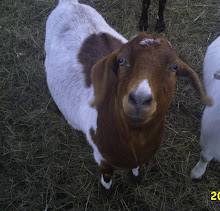Through daily observation the goat owner will learn what is normal for the individuals in their herd and will be able to quickly spot a goat that just isn’t acting right, one that may be sick. Early assessment and action greatly increases the chances of a successful outcome to treatment.
Some warning signs of a goat that may be sick or need medical attention are:
- A goat that separates itself from the rest of the herd.
- Standing with its head and tail down, with a hunched back.
- Trembling, muscle twitching or head shaking.
- A goat that is anxious or weak, listless or reluctant to move.
- Poor appetite, won't eat or won't drink.
- Change in consistancy or color of feces, scouring (diarrhea) or tapeworm segments.
- Strains to urinate, unable to urinate, or blood in the urine.
- Fever (above 103.5) or subnormal temperature. (below 101.5)
- Moans or cries.
- Grinding teeth, signs of pain.
- Bloated, kicking or biting at stomach.
- Enlarged knees or recuring abscesses.
- Rapid, shallow breathing.
- Chronic cough or sweet smell to breath.
- Cloudy or green nasal discharge.
- Cloudy, watery, closed eyes or a discharge from them.
- Dull, scruffy coat, sores, scabs or other skin problems.
- Excessive rubbing, scratching or biting at lower legs.
- Soft swelling under face (bottlejaw), white gums and inner eyelids.
- Abnormal color or consistency of milk.
- Hot, lumpy or hard udder.
- Limping, tender "walking on eggshells" gait or a bad, distinctive odor to hooves.
- Unsteady, drunken like gait, circling or stiff sawhorse like stance.
- Unable to stand, lies on side making paddling movements.
- Unexplained weight loss.
Although goats are typically hardy animals, they can still be susceptible to parasites, illness and diseases. A preventative disease program should be discussed with your goat knowledgeable veterinarian.
By Jennifer Fulton
All Rights Reserved









No comments:
Post a Comment